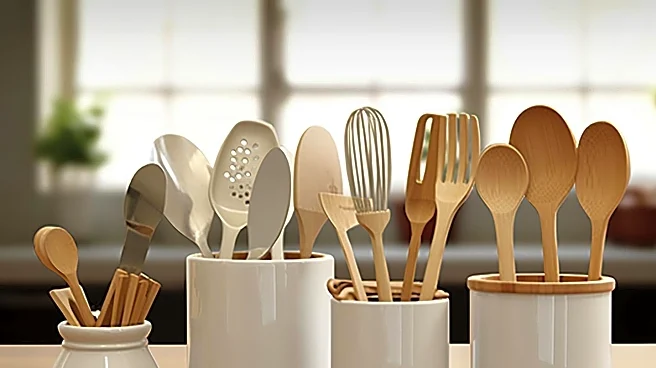What's Happening?
Professional chefs have shared their insights on kitchen gadgets, highlighting which tools are essential and which are unnecessary. The chefs emphasize the importance of basic tools like sharp knives, sturdy cutting boards, and reliable pans, which they believe are more effective than many specialized gadgets. They argue that these basic tools help build confidence in the kitchen and avoid clutter. Among the gadgets deemed unnecessary are mandolins, onion holders, and electric can openers. Chefs suggest that mastering knife skills and using simple tools can provide more control and precision in cooking. The advice aims to guide consumers in making informed decisions about kitchen tools, encouraging them to invest in items that are used daily rather than falling for flashy products.
Why It's Important?
The chefs' critique of kitchen gadgets highlights a broader trend towards minimalism and efficiency in cooking. By focusing on essential tools, home cooks can improve their culinary skills and reduce kitchen clutter. This approach can lead to better cooking outcomes and a more enjoyable cooking experience. The emphasis on basic tools also reflects a shift away from consumerism, encouraging people to make thoughtful purchases. This advice can impact the kitchenware industry, potentially influencing product design and marketing strategies. Consumers stand to benefit by saving money and space, while manufacturers may need to adapt to changing preferences for simplicity and functionality.
What's Next?
As consumers become more aware of the benefits of using essential kitchen tools, there may be a shift in purchasing habits. Manufacturers could respond by focusing on quality and durability in their products, rather than novelty. Cooking schools and culinary programs might emphasize knife skills and basic techniques, aligning with the chefs' advice. Additionally, retailers may adjust their inventory to cater to the demand for reliable, long-lasting kitchen tools. This trend could also lead to increased interest in cooking classes and workshops that teach fundamental skills, further promoting the chefs' message of simplicity and efficiency in the kitchen.
Beyond the Headlines
The chefs' critique of kitchen gadgets touches on ethical and environmental considerations. By reducing reliance on single-use or specialized tools, consumers can decrease waste and promote sustainability. This approach aligns with broader cultural shifts towards eco-friendly practices and mindful consumption. The focus on essential tools also encourages a deeper appreciation for cooking as a skill, rather than a task facilitated by gadgets. This perspective can foster a greater connection to food and the culinary arts, enhancing the cultural significance of cooking in everyday life.








